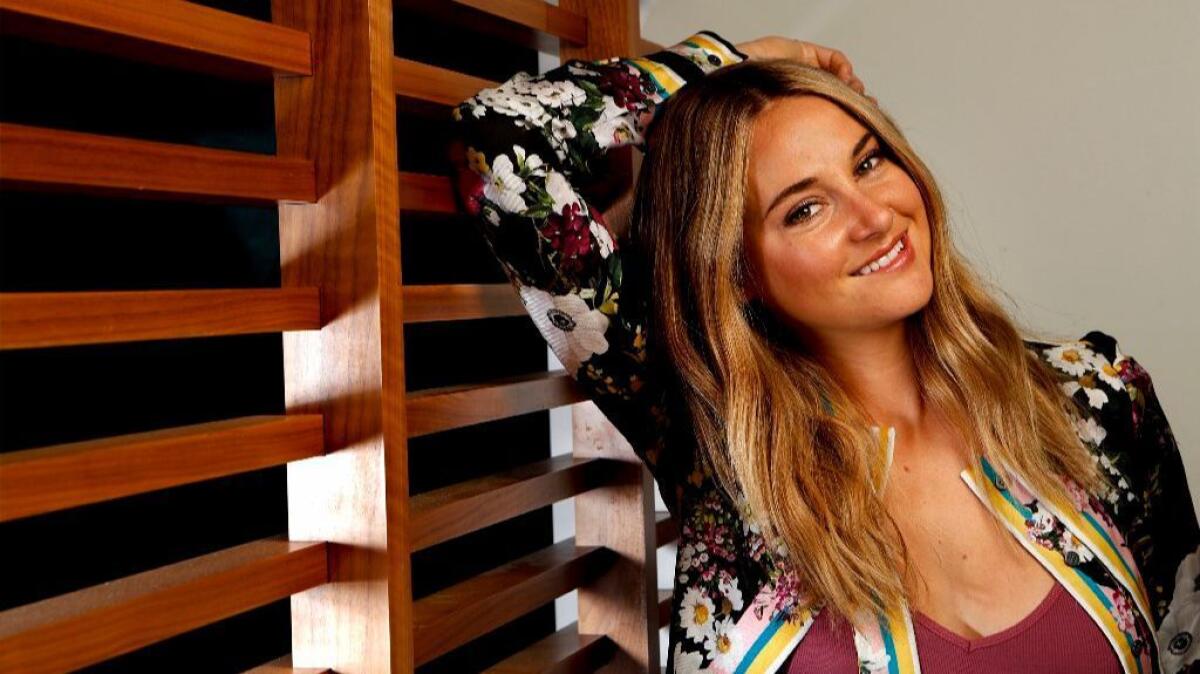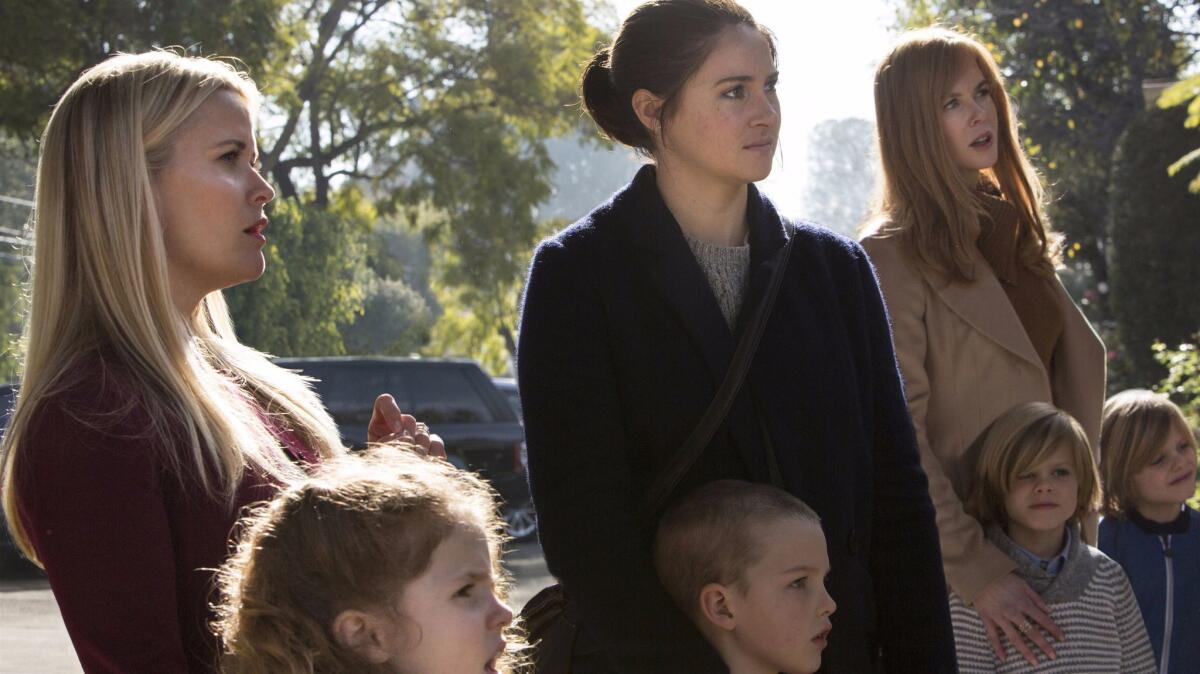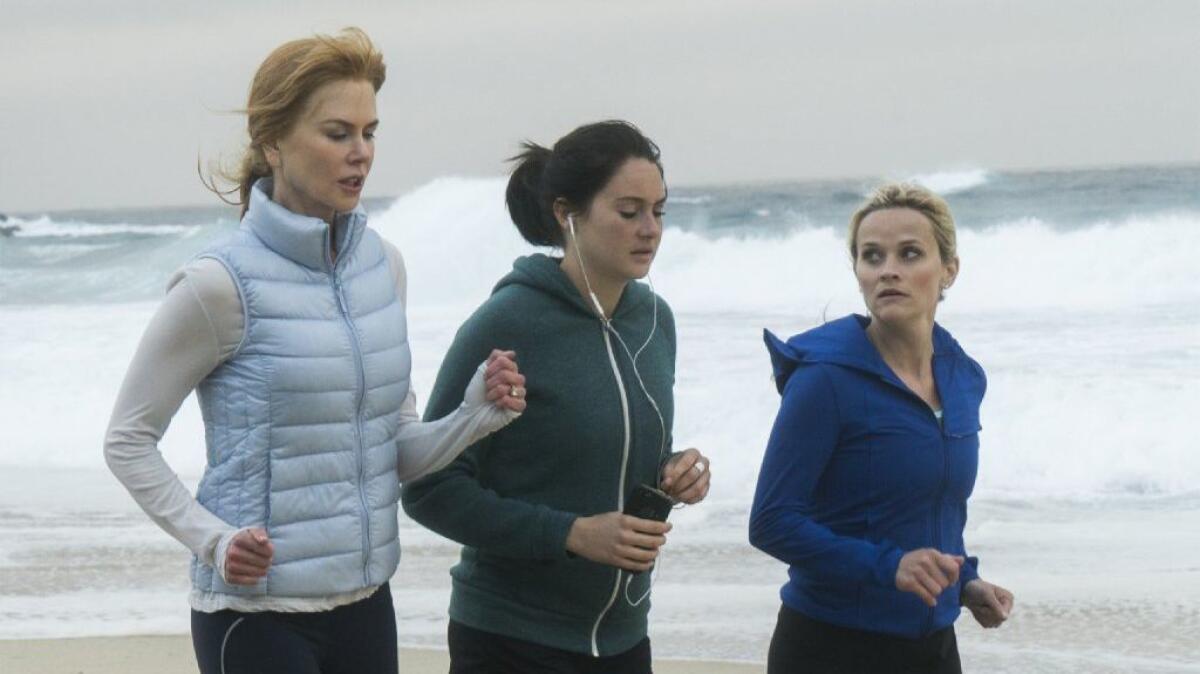Q&A: For Shailene Woodley, shooting the painful, traumatic scenes of ‘Big Little Lies’ was nothing but fun

- Share via
It wasn’t the showiest part in the bunch, but it packed a wallop. In the HBO miniseries “Big Little Lies,”
Sitting on a couch in HBO’s L.A. offices, Woodley wears a T-shirt, jeans and, as a concession to an upcoming photo shoot, high heels. Later she’ll put a shot up on Instagram standing in front of the building barefoot. Born and raised in the Valley, she lives in Hawaii when she’s not working. But she’s almost always working.
At 25, Woodley has been acting for 20 years, earning a Golden Globes nod for her role in “The Descendants” and anchoring the “Divergent” film series. Equally passionate about social activism, last year she spent the better part of six months at Standing Rock protesting the Dakota Access Pipeline, and was arrested for her efforts. She uses her time in both worlds to forge bonds with groups she might not know otherwise — even rich Monterey moms.

Jane seemed to be a way into the story for people who might not relate to the posh setting.
For me as well, because I had a hard time relating to any of those women and the glamorous lifestyle of Monterey, Calif. Because of Jane’s ability to see them, hear them, accept them, love them and because of their ability to do that with her, it created a reflection of empathy for me in my own life -- who are the people that I immediately don’t relate to, but what through lines do we have that actually provide healing for both of our internal processes.
She is this single mother who’s dealing with a really dynamic trauma, a kid herself trying to fit into an adult’s world, and is thrust into a community of privilege. I can only imagine how difficult that is. On the one hand, you want to fit in and be accepted. On the other hand, you notice things that aren’t quite right.
Jane is recovering from a brutal rape, and her life is made even harder when her young son is accused of abusing a girl at school. How did you navigate all of that?
The only thing was that I didn’t ever want to step on anyone’s toes who had been in the position that she was in. I wanted to honor that situation as truthfully as possible. I was definitely being hypersensitive and hyper-aware to the gravity of rape and the gravity of these circumstances that millions of women go through every single day, and wanting to bring as much truth as possible to Jane’s character in order to honor all of them as well.
Any time that you’re working with someone you’re close with that has any type of anger or animosity, it becomes humor the second the camera cuts.
— Shailene Woodley, on fight scenes with costar and friend Laura Dern
Laura Dern plays your nemesis here, after she played your loving mother in “The Fault in Our Stars.” What were those battles like?
So fun. There were so many moments when we would have to start laughing, especially during that fight scene, because she played my mom and we’re also very close in real life, so any time that you’re working with someone you’re close with that has any type of anger or animosity, it becomes humor the second the camera cuts.
Iain Armitage, who plays Jane’s son Ziggy, started acting almost the same age you did. How did you work together?
That kid is a genius. If I could do every scene with him all over again, I would. The very special thing about him is that he was aware of the camera enough to know that he had to turn it on a little bit, but he hadn’t developed ego enough to inhibit him from still picking his nose in the middle of a scene, or scratching his neck. That was also something that I learned a lot from, just that reminder of wonder in cinema, as well as in life.

For a murder mystery with rape and domestic abuse, the series had the happiest ending imaginable. Was that group scene on the beach cathartic?
The beach was so special because we filmed the show as much in chronological order as we could, so the scene at the end was one of the last things we all had together.
The pain was still there, the trauma was still there, the fear was still there and present amongst all of these women, but what they had was a unity and a trust and a respect and a certain reverence for each other that could only have developed from the interactions that preceded that moment. It felt very hopeful to me to see all of these women show up in their own way, with their own stories and their own histories and their own belief systems that are all very different, and yet choose no matter what to be an ally for each other, to be a sister for one another.
ALSO:
So who died? Six things we learned from that 'Big Little Lies' finale
From the Oscars to the Emmys.
Get the Envelope newsletter for exclusive awards season coverage, behind-the-scenes stories from the Envelope podcast and columnist Glenn Whipp’s must-read analysis.
You may occasionally receive promotional content from the Los Angeles Times.







